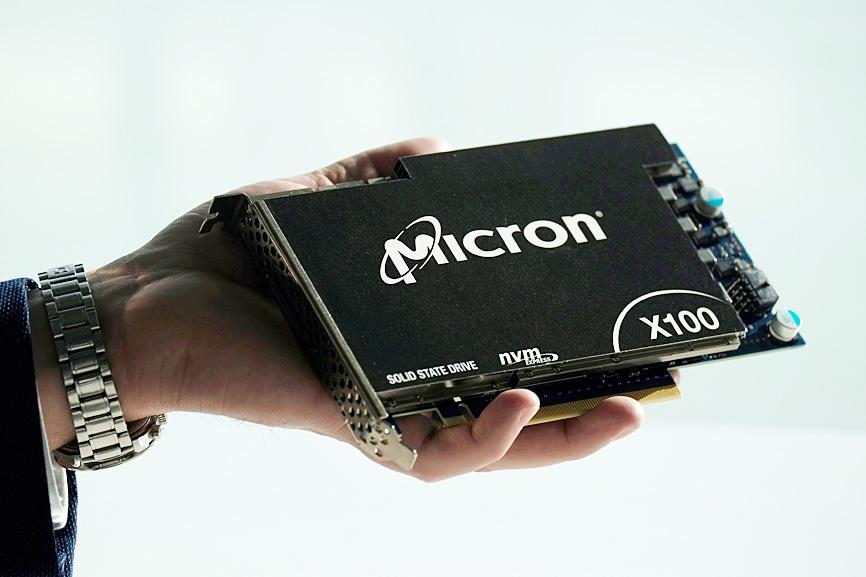Micron Technology Inc, the largest US maker of memory chips, gave an upbeat forecast for the current quarter, a sign that demand remains strong from rapidly expanding data center customers.
Sales would be about US$8.7 billion in its fiscal third quarter, Micron said in a statement on Tuesday.
That compares with an average analyst estimate of US$8.2 billion, according to data compiled by Bloomberg.

Photo: Reuters
Excluding certain items, profit would be about US$2.46 a share, topping the US$2.24 prediction.
Memory chips are used in a wide range of devices, making them less subject to fluctuations in demand for PCs and smartphones. That has helped Micron continue to grow even as the PC market slows.
Data center sales have been a particular bright spot, surging more than 60 percent last quarter. Industrial sales also gained about 60 percent in the period, and automaker revenue set a record.
While the number of PCs and smartphones being shipped is not growing, the amount of memory those devices need is, Micron chief executive officer Sanjay Mehrotra said.
“Micron is looking at a record year in fiscal 2022,” he said in an interview. “Our end-market demand is strong, our customers’ demand is strong and supply is constrained.”
In the three months that ended on March 3, Micron’s revenue grew 25 percent to US$7.79 billion. Net income was US$2.26 billion, or US$2 a share, up from US$603 million, or US$0.53, a year earlier.
Micron competes with South Korea’s Samsung Electronics Co and SK Hynix Inc, as well as Japan’s Kioxia Holdings Corp.
DRAM chips hold information temporarily, helping processors crunch data. NAND flash memory, meanwhile, acts as permanent storage in smartphones and computers. Recent production problems at Kioxia plants caused some of its products to be unusable, helping boost prices of NAND semiconductors. Samsung dominates production of both major types of chips.
Historically, the PC market has driven demand for memory. That industry enjoyed a surge during the COVID-19 pandemic, fueled in part by stuck-at-home workers buying new equipment.
However, it has slowed more recently.
Micron said on Tuesday that it expects PC shipments to be flat this year compared with last year.
The Russian invasion of Ukraine would not affect Micron’s production, but the region’s role as a source of gases and some minerals used in chip manufacturing means that some costs might go up, the company said.
The return of lockdowns in China related to the COVID-19 pandemic represents a risk to the electronics supply chain, Mehrotra said.
As with many companies, the price of energy, transport, raw materials and wages are going up, he said.
Micron is able to offset this inflationary pressure by improving its production techniques to make itself more efficient.
It is doing that faster than its competitors, he said.

INVESTMENT: Jun Seki, chief strategy officer for Hon Hai’s EV arm, and his team are currently in talks in France with Renault, Nissan’s 36 percent shareholder Hon Hai Precision Industry Co (鴻海精密), the iPhone maker known as Foxconn Technology Group (富士康科技集團) internationally, is in talks with Nissan Motor Co’s biggest shareholder Renault SA about its willingness to sell its shares in the Japanese automaker, the Central News Agency (CNA) said, citing people it did not identify. Nissan and fellow Japanese automaker, Honda Motor Co, are exploring a merger that would create a rival to Toyota Motor Corp in Japan and better position the combined company to face competitive challenges around the world, people familiar with the matter said on Wednesday. However, one potential spanner in the works is

SEMICONDUCTORS: Samsung and Texas Instruments would receive US$4.75 billion and US$1.6 billion respectively to build one chip factory in Utah and two in Texas Samsung Electronics Co and Texas Instruments Inc completed final agreements to get billions of US dollars of government support for new semiconductor plants in the US, cementing a major piece of US President Joe Biden administration’s CHIPS and Science Act initiative. Under binding agreements unveiled Friday, Samsung would get as much as US$4.75 billion in funding, while Texas Instruments stands to receive US$1.6 billion — money that would help them build facilities in Texas and Utah. The final deals mean the chipmakers can begin collecting the funding when their projects hit certain benchmarks. Though the terms of Texas Instruments’ final agreement is

Call it an antidote to fast fashion: Japanese jeans hand-dyed with natural indigo and weaved on a clackety vintage loom, then sold at a premium to global denim connoisseurs. Unlike their mass-produced cousins, the tough garments crafted at the small Momotaro Jeans factory in southwest Japan are designed to be worn for decades, and come with a lifetime repair warranty. On site, Yoshiharu Okamoto gently dips cotton strings into a tub of deep blue liquid, which stains his hands and nails as he repeats the process. The cotton is imported from Zimbabwe, but the natural indigo they use is harvested in Japan —

Japan ramped up its warnings against currency speculation on Friday after the yen slid to a five-month low following a hint from the central bank chief that he might wait longer than expected before raising interest rates. “The government’s deeply concerned about recent currency moves, including those driven by speculators,” Japanese Minister of Finance Katsunobu Kato said. “We will take appropriate action if there are excessive moves in the currency market.” The yen regained some ground against the dollar after Kato’s remarks, strengthening to as much as ¥156.89 after earlier weakening to ¥157.93. The Japanese currency strengthened a little further after currency